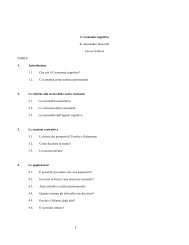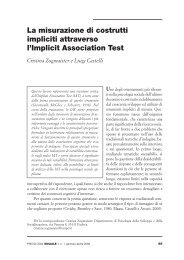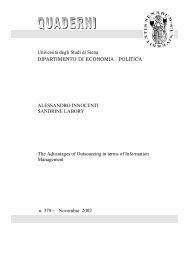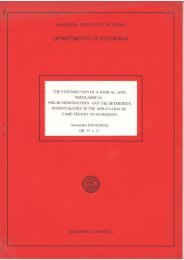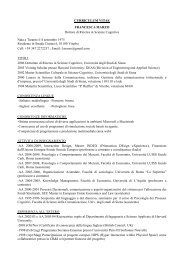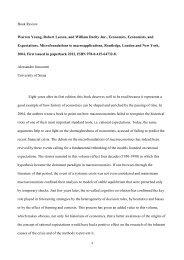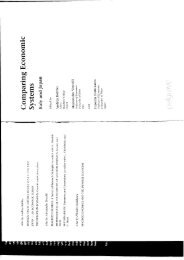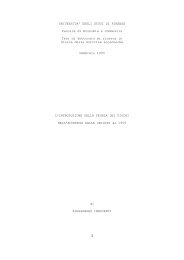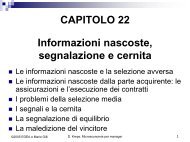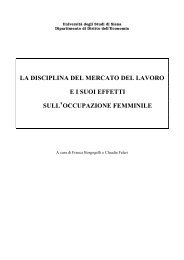Abstracts Book - LabSi
Abstracts Book - LabSi
Abstracts Book - LabSi
You also want an ePaper? Increase the reach of your titles
YUMPU automatically turns print PDFs into web optimized ePapers that Google loves.
only demand for flexibility, while others neither one. We find that (1) two-thirds of the subjects<br />
cannot be accounted for with the canonical exponential discounting model; and (2) there is demand<br />
for both pre-commitment and flexibility.<br />
Anna Conte,*° Daniela Di Cagno° and John Hey**° (* Tor Vergata University and FAO of the UN,<br />
**University of York, °Luiss Guido Carli)<br />
“Risk Aversion, Demographics and Unobserved Heterogeneity. Evidence from the Italian TV<br />
Show “Affari Tuoi””<br />
Affari Tuoi is a TV show in Italy. It is a 5 step interactive game between a player and an auctioneer.<br />
The game starts with 20 players, one coming from each of the Italian regions. There are 20 boxes<br />
containing the following prizes (expressed in Euros):<br />
0.01, 0.2, 0.5, 1, 5, 10, 50, 100, 250, 500,<br />
5000, 10000, 15000, 20000, 25000, 50000, 75000, 100000, 250000, 500000.<br />
The 20 boxes are randomly assigned to the 20 players. In each game one of the players is randomly<br />
selected and plays against the auctioneer, who knows what the content of the player’s box is. The<br />
player first opens six of the boxes assigned to the other players, losing the possibility to win the<br />
prices contained therein. At this point, the auctioneer either offers the player the chance to change<br />
his box with one of the remaining boxes, or offers the player an amount of money (which the<br />
auctioneer decides). If the player accepts the money, the game ends. Otherwise, he or she goes on<br />
with the game. There are four further potential rounds, in each of which the player opens three more<br />
boxes and the same procedure is repeated. If the player gets to the final round without having<br />
accepted any offer of the auctioneer, the player wins the contents of the box that he or she has at<br />
that point. Players’ choices between the money offers and the unknown prize in their box are binary<br />
choices between a lottery where the player can win one of the amounts left and a degenerate lottery<br />
with a prize that can be won with probability equal to one.<br />
This TV show is an excellent example of a natural experiment with clearly defined rules.<br />
The primary aim of this paper is to use data collected from 293 shows to estimate the preference<br />
functional of the players, which we assume to be a function of demographic variables and<br />
unobserved heterogeneity. We start assuming that the preferences are Expected Utility preferences<br />
and we estimate the risk aversion parameter of the players. We can test whether these preferences<br />
are stable through the show, or whether they change as the show progresses. We can also discover<br />
how risk attitude depends upon demographics.<br />
SESSION C2 – LEARNING AND INFORMATION<br />
Andrea Morone (Max Planck Institute of Economics and Università di Bari)<br />
“Iterative naïve best reply vs. elimination of dominated strategy in a p-beauty contest”<br />
In the last decade an increasingly effort has been devoted to explore the p-beauty contest game. The<br />
game itself is well known and extremely simple: players are asked to choose a number from a<br />
n<br />
1<br />
closed interval. The target number is G = p g , where 0 < p < 1 is a parameter, n is the<br />
n i<br />
t1<br />
number of players in the contest and g i €[0,100 ] is subject i’s guess. It is well known that for all p<br />
< 1 the unique equilibrium is 0. “Traditional economic theory postulates an ‘economic man,’ who,<br />
in the course of being ‘economic’ is also ‘rational.’ This man is assumed to have knowledge of the<br />
relevant aspect of his environment which, if not absolutely complete, is at least impressively clear<br />
18



